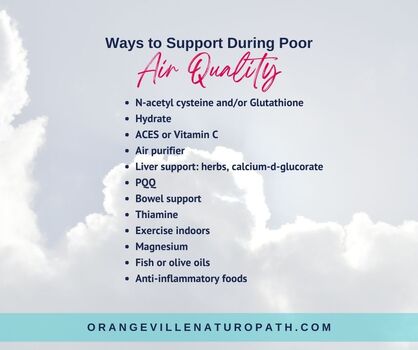Smoke particulate matter in the air is not just burnt trees, it's from whatever material was consumed by flames. Absorption of these particles via the lungs provides entry into the blood, and from there, anywhere. There are ways to mitigate the effects, encourage detoxification and breakdown of the products, and protect and heal the organs and tissues as much as possible.
Signs of acute exposure challenges could be difficulty breathing, headaches, and dizziness. (We also know from fire fighters, for example, that there are other considerations from long term exposure.)
Ways to Support in the Moment
- Hydration and Anti-inflammatory Foods
- flush with water, provide raw materials, and remove other pressures of inflammation from the body
- fish oils are anti-inflammatory and help strengthen cell membranes (as does choline)
- water and fibre keep the bowels moving and allow things to have a route out - Antioxidants
- NAC -> precursor to glutathione, great for detox
- Glutathione -> main antioxidant of the liver and lungs
- ACES or plain Vitamin C
- PQQ - Liver Support
- milk thistle
- calcium-d-glucorate
- magnesium
- NAC/Glutathione
- B vitamins - Air Purifier
- there are many options with different levels of filtration and price point
- great for other occasions as we know that indoor air is often not great either, some are designed for VOCs and other off-gassing, mold, allergens
- Brand ideas: IQAir, Jaspr, Intellipure - Limit Exposure
- exercise indoors
- recirculate air in the car or home during acute exposure
- change furnace filters often
After the Fact
- Continue lung and liver support, an anti-inflammatory diet, and also consider a lung cleanse (you may have heard of a liver or gut cleanse, but yes you can do a lung cleanse too!)
I wanted to get this information out to you as soon as possible, so it's just a quick one today without the usual depth. Basically, supporting the lungs, neutralizing free radicals, breaking down and flushing compounds from the body, and limiting exposure as best as possible are the takeaways here.
Even when factors seem to be outside our control there are still actions we can take to support and improve our response to the environment around us.
Take good care,
Dr. Christa
** This is information not advice. Speak to your practitioner about a personalized plan.

 RSS Feed
RSS Feed